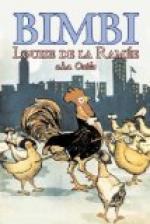Luca, indeed, never thought of these things, but the other three pupils did, and other youths as well. Had it not been for the limitation as to birth within the duchy, many a gallant young painter from the other side of the Apennines, many a lusty vasalino or boccalino from the workshops of fair Florence herself, or from the Lombard cities, might have traveled there in hot haste as fast as horses could carry them, and come to paint the clay for the sake of so precious a recompense. But Urbino men they had to be; and poor Luca, who was so full of despair that he could almost have thrown himself headlong from the rocks, was thankful to destiny for even so much slender mercy as this,—that the number of his rivals was limited.
“Had I been you,” Giovanni Sanzio ventured once to say respectfully to Signor Benedetto, “I think I should have picked out for my son-in-law the best youth that I knew, not the best painter; for be it said in all reverence, my friend, the greatest artist is not always the truest man, and by the hearthstone humble virtues have sometimes high claim.”
Then Signor Benedetto had set his stern face like a flint, knowing very well what youth Messer Giovanni would have liked to name to him.
“I have need of a good artist in my bottega to keep up its fame,” he had said stiffly. “My vision is not what it was, and I should be loath to see Urbino ware fall back, whilst Pesaro and Gubbio and Castel Durante gain ground every day. Pacifica must pay the penalty, if penalty there be, for being the daughter of a great artist.”
Mirthful, keen-witted Sanzio smiled to himself, and went his way in silence; for he who loved Andrea Mantegna did not bow down in homage before the old master-potter’s estimation of himself, which was in truth somewhat overweening in its vanity.
“Poor Pacifica!” he thought; “if only my ’Faello were but some decade older!”
He, who could not foresee the future, the splendid, wondrous, unequaled future that awaited his young son, wished nothing better for him than a peaceful painter’s life here in old Urbino, under the friendly shadow of the Montefeltro’s palace walls.
Meanwhile, where think you was Raffaelle? Half the day, or all the day, and every day whenever he could? Where think you was he? Well, in the attic of Luca, before a bowl and a dish almost as big as himself. The attic was a breezy, naked place, underneath the arches supporting the roof of Maestro Benedetto’s dwelling. Each pupil had one of these garrets to himself,—a rare boon, for which Luca came to be very thankful, for without it he could not have sheltered his angel; and the secret that Raffaelle had whispered to him that day of the first conference had been, “Let me try and paint it!”
For a long time Luca had been afraid to comply, had only forborne indeed from utter laughter at the idea from his love and reverence for the little speaker. Baby Sanzio, who was only just seven years old as the April tulips reddened the corn, painting a majolica dish and vase to go to the Gonzaga of Mantua! The good fellow could scarcely restrain his shouts of mirth at the audacious fancy; and nothing had kept him grave but the sight of that most serious face of Raffaelle, looking up to his with serene, sublime self-confidence, nay, perhaps, rather, confidence in heaven and in heaven’s gifts.




